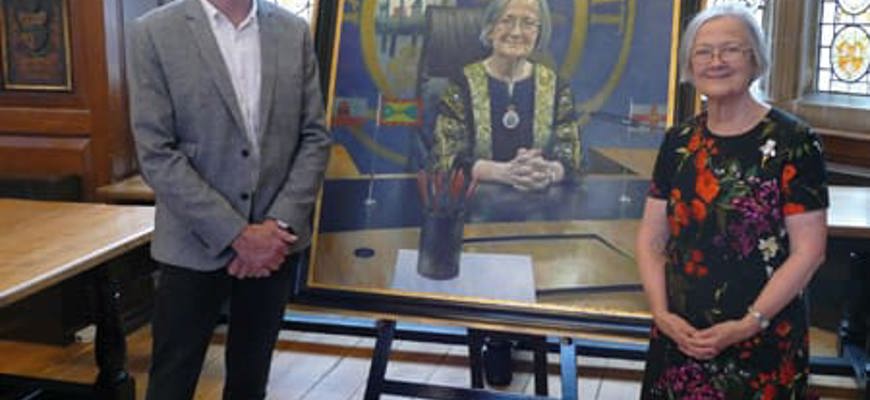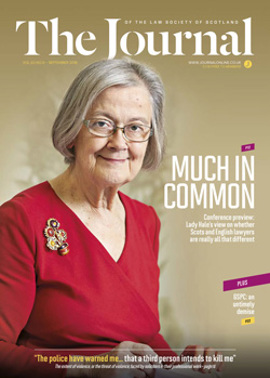Leading judgment

If you are looking for big name speakers to headline your legal conference, they don’t come much bigger than the President of the UK Supreme Court. The Law Society of Scotland has been fortunate to secure the services of Lady Hale to deliver the first keynote address at this year’s Leading Legal Excellence event, on 26 October.
Scottish cases appealed to London have regularly been both high profile and contentious, both in private law (negligence and family law issues have been prominent) and public law (judgment is currently awaited on the competence of the Scottish Parliament’s EU Withdrawal (Legal Continuity) Bill, for example). So when Lady Hale chooses to speak on “The contribution of Scottish cases to developing United Kingdom law”, we can anticipate some thought-provoking comments.
Some Scots lawyers might raise an eyebrow even at her title. Is there such a thing as UK law? Does it not tend to be used by those who assume English law applies to the whole of the UK?
Hale is undeterred at the suggestion. “There certainly is such a thing as UK law. Much of the statute book applies throughout the UK, including the whole of EU law (for now), human rights law, employment and equality law, social security, immigration and tax law. And it is acknowledged that some areas of the civil law should develop in the same way both north and south of the border, most notably the law of negligence, which is very largely derived from cases emanating from Scotland – so much so that the English might say that it has meant applying Scots law to England.”
And while her main focus is on Scottish cases appealed to the House of Lords or the UK Supreme Court, she points out that cases decided by the Scottish courts can also be influential in appeals from the other parts of the UK, and are regularly cited.
Wha’s like us?
Hale’s advance publicity highlights that “Above all, these days, Scottish cases have been at the forefront of the developing devolution jurisprudence.” But do they, I wonder, have a wider relevance for the rest of the UK when each jurisdiction has a different settlement?
“There are some common themes that apply across all three devolution settlements,” she replies, “so the Scottish cases have relevance for Wales and Northern Ireland and vice versa. It is not surprising that the Welsh and Northern Irish Law Officers intervened in the recent reference from Scotland” – on the EU Withdrawal Bill.
Again, the publicity poses the teasing question whether the cases “tell us anything about the special character of Scottish litigators? Or are we more alike than we are different?” Could it not just be, I ask, that Scottish cases are different to Hale as an English lawyer simply because they are Scottish?
Her reply prolongs the intrigue: “But the answer could be that, as far as it seems to us in the Supreme Court, there is no – or very little – difference, and we are all the same under the skin. Would that be a disappointment to you?”
I try another tack. Scots lawyers often take pride in their law as a system built on principle, contrasting it to the precedent-based development of the English common law. As an English lawyer who has become familiar with the Scottish system, does she see the comparison as valid? Do Scots lawyers have a different way of thinking?
Less than we might like to believe, is again the answer here. “Oliver Wendell Holmes may have said that ‘The life of the law has not been logic; it has been experience,’ but he was comparing law to mathematics. It is a great mistake to think that the common law is not also made up of principles – the principles developed by the judges over the centuries rather than derived from a codified rule book. Those codified rule books were themselves derived from a multitude of decided cases, as is the common law, and have since been developed by the judges in much the same way. We have more in common than some of us think.”
To broaden the scope a bit, I query whether having separate legislation on both sides of the border can also influence the court’s thinking. A likely candidate is in Hale’s own field of family law, particularly the different approaches to financial rights on divorce or for cohabitants. Can it be said that the court does sometimes take note of these, even if they cannot directly influence the result of a case?
“We do indeed sometimes take note of the separate legislative developments on both sides of the border. In family law it is fair to say that at present Scottish law is something of an outlier when compared with England & Wales, Northern Ireland and the Republic of Ireland. But there is a move to bring English law closer to that in Scotland, as championed for example, by the English judges in Gow v Grant. Other moves in that direction might be less popular than giving financial remedies to cohabitants.”
The court and the constitution
Turning to the court itself, what in the President’s view has been the impact of the Supreme Court choosing to sit outside London, either on the court or more widely?
“For us it has been a fascinating and rewarding experience and I wish that we could afford to do it more often and to go to more places – the north of England springs immediately to mind. We have been very warmly received in both Edinburgh and Belfast, so I hope that it has brought us closer to the whole population whom we are here to serve.”
Is the court evolving into a more constitutional type court? A particular illustration might be the Northern Ireland abortion case, where Hale was one of the Justices who wrote on the respective roles of the courts and the legislature, in particular in matters of fundamental human rights.
“We shall never be the sort of constitutional court which can strike down Acts of the sovereign United Kingdom Parliament,” she responds. “But that Parliament has given us a constitutional role, most notably in relation to the devolved institutions, but also in the Human Rights Act, and the common law has given us judicial review of administrative action, which is also a constitutional function.”
That case is not the only one in recent times to have raised sharply the question of what is properly to be left to the discretion of the legislature and what is a question of fundamental rights on which it is proper for the courts to rule. Is there a trend towards the courts being faced more regularly with having to decide where to draw that line?
“The Human Rights Act contains within it one answer to that question – if a provision in an Act of Parliament is incompatible with the Convention rights, we can only make a declaration of incompatibility, which leaves it to Parliament to decide what, if anything, to do about it. The more difficult question is how far we should defer to the judgment of the primary decision-maker, whether Government or Parliament, in deciding what is incompatible.”
Politics apart
Political issues come in many guises, and given the state of politics today, including the potential for conflict between the different legislatures in the UK, is the court inevitably going to become more involved in what are essentially political disputes?
Hale suggests we should not overlook historical controversies. “Politics of one sort or another have often lain behind the cases which come before the courts – consider the great case of Entick v Carrington in the 18th century, which was all about the Government trying to suppress its political opponents. The courts have no choice but to adjudicate upon the cases which come before them and raise properly justiciable questions – as all sides agreed the case of R (Miller) v Secretary of State for Exiting the European Union did. We have to do our best to judge them according to the law and our judicial oaths, irrespective of the underlying political dispute.”
It is a fairly safe prediction that Lady Hale’s conference address will be more than just a survey of some headline cases – “I hope so” is all she gives away when the point is put to her – but just how she will challenge her audience to think will have to await the day.
Probably she is still formulating her own questions. Such addresses are a regular part of the life of a Supreme Court Justice, and while it might appear an onerous commitment on top of their judicial work, for Hale “It’s an important part of the job – getting out and about, meeting people and trying to explain our role. But I also find that I learn a lot through writing lectures, and I expect to learn a lot through writing this one.”
In this issue
- Confidence restored: internal investigations and legal privilege
- Court reforms: still an unknown quantity
- Ruled out of court?
- Uncovering the environment (1)
- Medical death: a case to answer
- Reading for pleasure
- Opinion: Kerry Trewern and Rhona McNair
- Book reviews
- Profile: Ryan McCuaig
- President's column
- Developing digital services
- People on the move
- Leading judgment
- Health check
- Open to attack
- Claims: beating the trigger
- Storage: time for digital
- GSPC: eulogy for a friend
- Relevant persons: a challenge
- New specialist land registration practice launches
- Good enough reason?
- Copyright: underpinning control
- Writing means writing
- Rent moves: two crucial hoops
- Debtor wins in policy decision
- Scottish Solicitors' Discipline Tribunal
- KIR: the time bomb explodes
- The guideline goal
- GC NextGen: a network for you?
- Your Law Society of Scotland Council members
- Public policy highlights
- Double boost for Society's AML team
- Ask Ash
- Practice rights and the impact of Brexit: working in the EU
- Acting as notary: what do I need to know?
- Engagement letters: a practical approach
- Uncovering the environment
- Paralegal pointers






